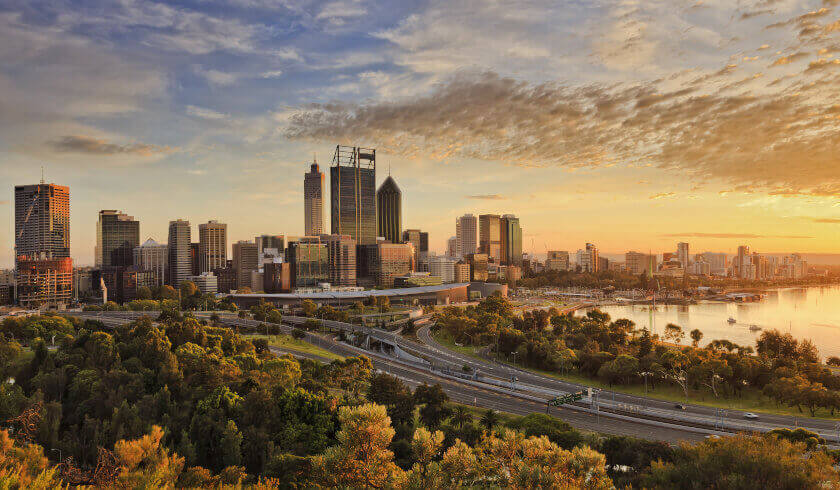Is Perth building back better, stronger after years of market downturn?
The Perth housing market is making a comeback after a long and deep decline, and experts say current market indicators could drive healthy price growth – but investors are cautious.

In an episode of the Smart Property Investment Show, host and investor Phil Tarrant put the spotlight on Western Australia, catching up with Real Estate Institute of Western Australia (REIWA) president Damian Collins for the latest updates on the Perth housing market.
According to Mr Collins, Perth’s property market saw solid price growth in 2021, with CoreLogic reporting a 13 per cent growth over the year. Even so, it was the lowest capital growth of all the major capital cities.
Housing bust to housing boom
Five years ago, the market was in “pretty miserable conditions related to oversupply from 2014 to 2015, which decimated the building industry,” explained Mr Collins.
Looking for better employment opportunities, tradies exchanged their building site jobs, which paid around $80,000-100,000 a year, for mining jobs, which paid $140,000 a year, Mr Collins expounded.
But Perth’s longest and deepest downturn could now be over because the tide turned during the pandemic.
“A lot of east coasters have an eye towards the west for lifestyle and employment opportunities, particularly trades,” said Mr Tarrant.
West Australia’s robust economy, low to almost zero COVID cases, and sparse lockdowns over the last two years are luring people to the resource state.
“We have got the highest income of any state in the country, except the ACT, higher than even Sydney and Melbourne on average,” claimed Mr Collins.
According to the REIWA president, properties in the state within 10 to 15 kilometres of Perth can be bought for half a million dollars on a six- or 700-metre block.
Compare that to Sydney or Melbourne – where a million dollars may not even stretch to buy many apartments within 10 kilometres of the CBDs.
Mr Collins described Perth’s current conditions as a “significantly under-supplied market” where the estimated “8,500 properties listed for sale” are “well below a balanced market of 13,000” sales volume.
The city’s rental vacancy rate has also hit an all-time low of 0.7 per cent – “the lowest we have been tracking on REIWA for 40 years,” he quipped.
Are people renting or buying?
As the rental market tightened, renters became upgraders, jumping on the opportunity to become home owners and taking advantage of low-interest rates.
Mr Collins said the rising rent got people thinking: “Why would I pay $450 or $500 a week rent when I can buy a home that is going to cost me $250 in interest payments?”
It means Perth has a very strong first-time home buyer market, with this particular segment comprising over 40 per cent of the market.
According to the president, this influx of first home buyers and relocators who have realised Perth is “a very affordable location to live” has posed new challenges for the city – especially in construction.
Due to pandemic-related pressures, it now costs 30 per cent more to build houses with materials 40 per cent more expensive – with a labour shortage to boot.
It used to take nine months to build a house, but now it takes nearly two years.
According to Mr Collins, “when the borders open up, that’s going to be problematic. We just won’t have enough housing. We can’t get enough supply in the market, and that’s going to certainly, I think, fuel further price growth in 2022.”
Why Perth investors are cautious
An uptick in upgrader and first home buyer activities attract investors, Mr Tarrant commented.
But are local and international investors rushing to get their hands on investment properties in Perth?
In general, local and out-of-state investors are tiptoeing back to Perth.
There are a number of reasons for this reluctant return, according to the president.
First, he referred to investment psychology, which states that “people’s most recent experiences tend to frame their outlook for the future”. Given that Perth’s market has been on a downturn for a couple of years, it’s taking time for local investors to quickly shift to their confidence level in the market.
Next, investors usually buy new properties from the equity of their current property. But since Perth’s market has been sliding downwards for the past years, investors have no equity to begin with that they can roll over to acquire new property, Mr Collins explained.
For those out-of-state, Mr Collins said east coast investors and international investors (mostly from Singapore) prefer to have the option to check out properties first, but closed borders have put a stopper to this activity.
Lastly, government moratoriums that prohibit landlords from kicking tenants out and from increasing rents has put off investors, said Mr Collins.
While acknowledging that the prohibition was reasonable during the first six months of the pandemic because things were uncertain, he said its extension did not sit well with investors.
Despite this, Mr Collins claimed that investor activity has picked up over the last few months – and looks set to continue to do so.
“I suspect they will consider how strong rents are and the low vacancy rate, then that’s certainly going to push the market up another leg in 2022,” he concluded.

